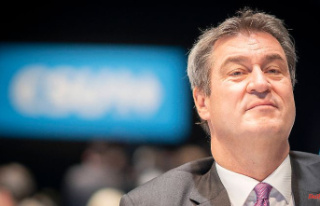The Gas Price Commission has submitted its proposals to the federal government. Much is still unclear, but at least the one-off reimbursement of the gas down payment in December is considered certain. But tenants are not yet feeling anything from the 2022 measure.
The design of the gas price brake for industry and consumers will probably cost the Bundestag and Federal Government a few more weeks and even more nerves. As is so often the case, the devil is in the detail, which is why even the target date of March is not reached in passing. All those involved want to get the previously announced one-off reimbursement of the gas advance payment in December underway all the faster.
The proposals of the gas price commission, which submitted its final report to the federal government on Monday, are already relatively well developed. They have a good chance of being implemented in this way or in a very similar way - simply because there is not enough time for debates about alternative proposals. The legal basis must be passed by the Bundestag in the second or fourth week of November, if it meets for the last time before December. The Commission calls adoption by November 18 as the target date. The federal cabinet wants to discuss the proposals this Wednesday.
The commission proposes that the money should be paid out by December 20 at the latest. The gas suppliers are responsible for the payment, the state will reimburse them the sum on December 1st of this year. To do this, the suppliers must give the federal government the total number of their supply contracts and a total amount before December 1st.
For the level of the payment amount, the Commission uses consumption in September and the gas price in December as a basis. The utility pays the amount to homeowners, apartment building managers and businesses accordingly. This also makes it clear that companies and owners of single-family homes in particular benefit directly from the reimbursement. Your overall costs for the current one are reduced by a twelfth. Those who do not pay in installments but pay their consumption monthly should be reimbursed for a twelfth of the forecast annual consumption.
Anyone who lives in an apartment building should benefit no later than the final bill for ancillary costs to be submitted in 2023 when the reimbursement is offset. To this end, the landlords and administrations of homeowners' associations should inform the respective households in writing that they have received the reimbursement and announce the offsetting for the 2022 utility bill. The respective state reimbursement must then be shown separately in the utility bill.
Quick relief for tenants tends to come from somewhere else: landlords who have already increased their advance payment requirements for the coming year - i.e. before the gas price brake planned for March comes into force - should be required by law to adjust their claims. The Commission paper does not reveal whether homeowners' associations will also have to adjust their advance payments.
One basic problem with the one-off down payment remains: It is granted for each individual gas connection - regardless of whether it is a villa with a heated pool, an average apartment building or a company. The suppliers do not know how many people live behind a connection and what they use the gas for. However, this also means that no lid can be inserted. Wealthy villa owners therefore get around a twelfth of their annual gas bill reimbursed, as do residents of a two-room cooperative apartment in a new building, even if the latter only have a fraction of the costs and at the same time are often much more in need of help in the crisis.
To ensure that wealthy people are not disproportionately relieved, the Commission proposes that the reimbursement should be stated in the income tax return as a non-cash benefit. From an annual income of 72,000 euros - the limit from which the solidarity surcharge also has to be paid - the reimbursement is then taxed as income. That reduces at least the net amount paid out by almost half.












